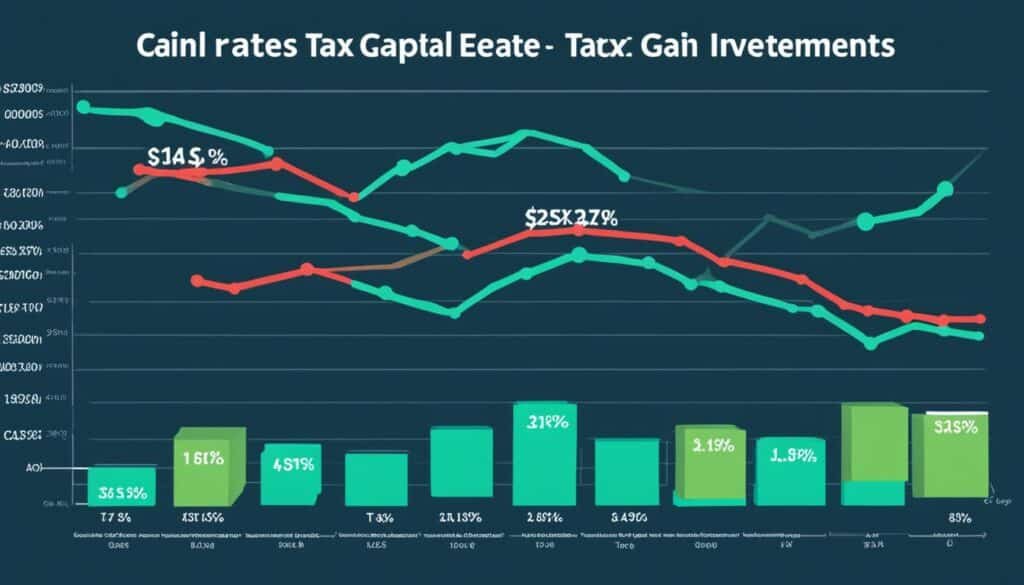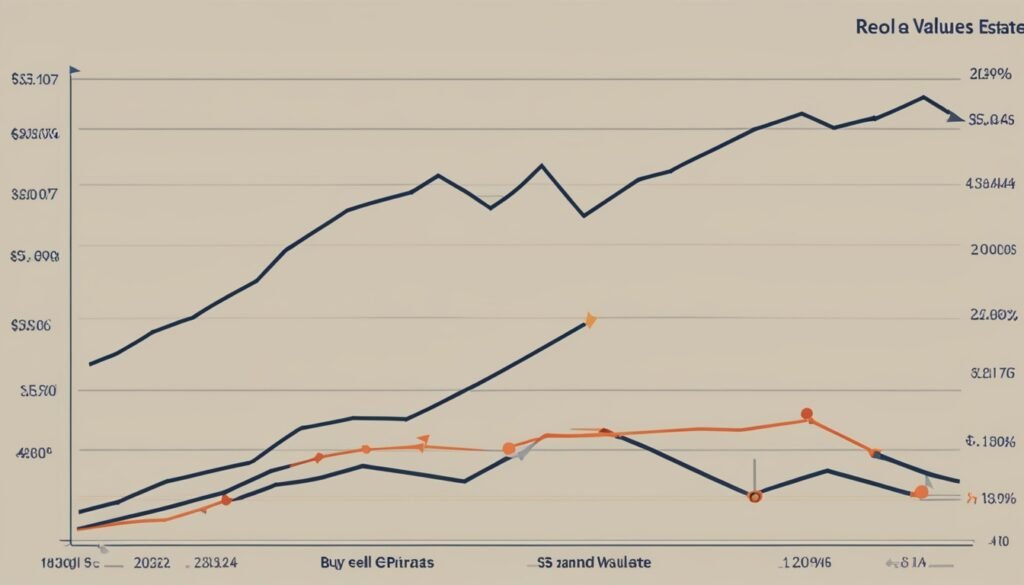Understanding how to figure out capital gains on real estate is key. When you sell a property for more than you paid, that extra money is your capital gain. The time you held the property affects how much tax you’ll pay on these gains. If it’s short-term (a year or less), you’re taxed at a higher rate. If it’s long-term (more than a year), you pay less in taxes. This is based on your individual tax bracket.
Different factors determine the tax rate on your capital gains. This includes the standard income tax rate and the length of time you owned the asset. Long-term gains get taxed at a lower rate, short-term at the same rate as your regular income. So, it’s usually better to hold onto your property for more than a year before selling.
Key Takeaways
- Capital gains are the profits made when selling an investment, such as real estate, for more than the original purchase price.
- The tax rate on capital gains depends on the holding period (short-term vs. long-term) and your regular income tax bracket.
- Long-term capital gains (held for more than a year) are typically taxed at a lower rate than short-term capital gains (held for a year or less).
- Calculating capital gains on real estate investments involves determining the basis, realized amount, and factoring in depreciation.
- Strategies like tax-loss harvesting and converting investment properties to primary residences can help reduce capital gains taxes.
What Are Capital Gains?
Capital gains are the profits from selling investments at a higher price. These investments include stocks, bonds, mutual funds, and real estate. If you sell for more than you bought, it’s a capital gain. But if it’s less, you have a capital loss.
Defining Capital Gains
The difference between what you sell an investment for and its original cost basis forms the capital gains. The cost basis is what you paid to buy the asset, plus any transaction fees or capital improvements. The capital gain is your profit when you sell it for more.
Also Read: Top 9 Technology Trend You Must Keep An Eye On
Short-Term vs. Long-Term Capital Gains
The holding period of an investment decides its tax rate. If you hold it for one year or less, it’s a short-term capital gain. Holding it for more than a year makes it a long-term capital gain.
Short-term capital gains are taxed at normal income tax rates, usually higher. But long-term capital gains have special, lower tax rates, making them more tax-friendly.
Capital Gains Tax Rates

The capital gains tax rates you pay change based on two things. First, how long you’ve owned the investment. Second, your regular income tax bracket. Knowing about long-term and short-term capital gains tax rates is key. This knowledge helps you plan your taxes better and lower what you owe.
Also Read: How Secure Is Domain Hosting?
Long-Term Capital Gains Tax Rates for 2023
In 2023, what you pay for long-term capital gains relates to your filing status and taxable income. If you fall in the 10% or 12% income tax bracket, you pay no long-term capital gains tax. Those in higher brackets, from 22% to 35%, pay 15%. And if you’re in the top 37% federal tax bracket, it’s 20%.
Long-Term Capital Gains Tax Rates for 2024
Looking ahead to 2024, long-term capital gains tax rates should stay unchanged. The same 0%, 15%, and 20% tax rates will likely apply. It’s always good to stay updated on tax changes. They can have a big impact on how you plan your taxes and your overall tax burden.
Short-Term Capital Gains Tax Rates
Short-term capital gains, from investments held for under a year, are taxed as part of your ordinary income tax rate. This includes tax rates from 10% to 37%, depending on your tax bracket. Recognizing the difference between short-term and long-term capital gains helps with making wise investment decisions. It also works to lower your tax burden.
| Filing Status | 2023 Long-Term Capital Gains Tax Rate | 2024 Long-Term Capital Gains Tax Rate |
|---|---|---|
| Single | 0% (up to $44,625), 15% ($44,626 – $492,300), 20% (over $492,300) | 0% (up to $45,000), 15% ($45,001 – $502,000), 20% (over $502,000) |
| Married Filing Jointly | 0% (up to $89,250), 15% ($89,251 – $553,850), 20% (over $553,850) | 0% (up to $90,000), 15% ($90,001 – $564,600), 20% (over $564,600) |
| Head of Household | 0% (up to $59,750), 15% ($59,751 – $523,050), 20% (over $523,050) | 0% (up to $60,000), 15% ($60,001 – $533,600), 20% (over $533,600) |
| Married Filing Separately | 0% (up to $44,625), 15% ($44,626 – $276,900), 20% (over $276,900) | 0% (up to $45,000), 15% ($45,001 – $282,300), 20% (over $282,300) |
Calculating Capital Gains on Real Estate

To figure out capital gains from real estate investments, there are a few steps. Knowing these helps in correctly handling capital gains tax. You have to pay this tax on the profit from selling investment property.
Also Read: How Can I Manage My VPS Hosting Server?
Determining Basis
First, let’s look at the basis. This is the starting point for working out capital gains. It’s the original purchase price of the investment property. It also includes any capital improvements you’ve made. Finding the right basis is critical. It helps in reporting sale profits properly.
Calculating Realized Amount
The realized amount is what you get from selling the investment property. This includes the sale price. To find the capital gains, deduct the basis from the realized amount.
Factoring in Depreciation
If you’ve used depreciation on the investment property, you must do something special. You’ll add this back to the realized amount when calculating capital gains. This makes sure the full sale’s economic gain gets taxed correctly.
Also Read: Exploring the Role of Artificial Intelligence in Education
Capital Gains and Tax Treatment

The tax rules for capital gains are different than those for regular income. The key difference is between earned and unearned income. Earned income means money from working like wages. It’s usually taxed at higher rates than unearned income. This unearned income comes from things like investments, including capital gains and interest. It’s taxed at lower rates.
Earned vs. Unearned Income
This difference is based on the idea that capital gains and other investment income are passive income. They don’t directly come from a person’s work. The government gives special tax treatment to investment income to stimulate the economy. This way, long-term capital gains are taxed less than regular income. This arrangement aims to lower the tax burden for investors. It also encourages more investment.
Also Read: Best Email Hosting Services In USA
Reducing Capital Gains Taxes
You can lower your capital gains tax bill by using tax-loss harvesting. This method is about selling investments that lost value. You then use these losses to reduce the tax on your profits from other trades. It’s a smart way to cut your tax deduction.
Tax-Loss Harvesting
Tax-loss harvesting is a smart tool for investors. It turns capital losses into tax benefits by using them to balance against capital gains. This is great when you’ve made profits on other trades. By selling off investments that didn’t do well, you can lower your tax bill.
Keeping an eye on your investment values is key to good tax-loss harvesting. Find the ones that have dropped in worth. Turning these investment losses into tax deductions can save you money. Being active in managing your gains and losses can really help with your taxes.
State Taxes on Capital Gains

Many states have their own capital gains taxes besides the federal taxes. Most states tax capital gains at the same rates as they do regular state income tax. But, a few states without state income tax don’t add extra taxes on capital gains tax.
States with high income tax rates usually have higher capital gains tax rates too. California, New York, and New Jersey have high state income tax burdens. This means they also have high capital gains tax liabilities. In contrast, places like Florida, Texas, and Nevada don’t have a state income tax. So, they don’t tax capital gains either.
| State | Capital Gains Tax Rate | State Income Tax Rate |
|---|---|---|
| California | 13.3% | 13.3% |
| New York | 10.9% | 10.9% |
| New Jersey | 10.75% | 10.75% |
| Florida | 0% | 0% |
| Texas | 0% | 0% |
| Nevada | 0% | 0% |
When selling investments or real estate, it’s crucial to consider the state capital gains tax. It can really change your total tax bill. Getting advice from a tax professional ensures you follow both federal and state capital gains tax laws.
Capital Gains on Property Sales
When you sell investment real estate, calculating the capital gains is important. The starting point is the cost basis of the property. This includes the original purchase price and any capital improvements. These might be renovations or major repairs made over time.
Adjusting Cost Basis
The cost basis can change in a few ways. If the property was used for a tax deduction, the basis goes down. But, if you spent money on the property to improve it, the basis goes up. Capital improvements like new additions or big remodeling projects do this.
Increasing Basis
Owners can make the cost basis larger by keeping records of capital improvements. Major upgrades or repairs can make up this list. These records are key for figuring out profit when you sell. They let you track any increase in the property’s value or life.
Reducing Basis
Depreciation can lower the cost basis. Over time, these tax breaks will reduce your starting value. Knowing this amount well is important. It affects how much tax you pay on capital gains when you sell.
Also Read: Us Money Reserve: The Place You Can Trust For Buying Gold And Silver
Strategies for Minimizing Capital Gains Taxes
If you own an investment property, you might worry about capital gains taxes when selling it. But, there’s a smart way to lower your tax bill. You can change your investment property into your main home before you sell it.
Making Investment Property Your Primary Residence
The home sale exclusion is a big tax break. It lets single filers keep the first $250,000 of profit tax-free. For married couples filing together, that break goes up to $500,000.
To use this, just live in the investment property for at least two out of five years before you sell. Doing so lets you cut or erase the taxes you’d pay on the gains.
But, there are rules to follow. You need to consult with a tax expert to make sure you qualify. They’ll help you through the process. With their help, you can lower your capital gains tax on the sale of your investment property. You might end up paying much less or even no tax at all.
FAQs
Q: What is a capital gain and how is it different from ordinary income?
A: A capital gain is the profit earned from the sale of a capital asset, such as real estate or stocks. Capital gains are taxed differently than ordinary income, with specific rates and rules that apply.
Q: How do I calculate capital gains on real estate investments?
A: To calculate capital gains on real estate investments, subtract the purchase price and any expenses related to the purchase and sale of the property from the selling price. The resulting amount is your capital gain.
Q: When do I need to pay capital gains tax?
A: You are required to pay capital gains tax when you sell an asset that has resulted in a capital gain. The tax is due in the tax year that the gain was realized.
Q: Are capital gains subject to different tax rates than ordinary income?
A: Yes, capital gains are subject to different tax rates than ordinary income. The rates vary depending on the asset, how long it was held, and your income tax bracket.
Q: Can capital losses offset capital gains for tax purposes?
A: Yes, capital losses can be used to offset capital gains for tax purposes. This means that if you have losses from the sale of assets, you can use them to reduce the amount of capital gains you owe taxes on.
Q: What is the difference between short-term and long-term capital gains?
A: Short-term capital gains are profits from the sale of assets held for one year or less, while long-term capital gains are from assets held for more than one year. The tax rates applied to these gains are different.
Q: How can I lower my capital gains tax bill?
A: You can lower your capital gains tax bill by offsetting gains with losses, taking advantage of tax exemptions, deferring the sale of assets, or investing in tax-advantaged accounts.
Q: What is the Net Investment Income Tax and how does it relate to capital gains?
A: The Net Investment Income Tax is an additional tax on certain types of investment income, including capital gains. It is imposed on individuals with high incomes and can affect the amount of taxes owed on capital gains.




